Unit of investment giant Starwood opposed efforts by Martin Ferris
The High Court dismissed the liquidator’s claim
The liquidator of an Irish company who has been seeking the return of £56m (€66m) paid by the firm to a connected Cyprus entity more than two years before he was appointed has failed in the High Court to have the transaction reversed.
Ireland-based Redefine Australian Investments was placed into voluntary liquidation in 2018.
The company was a unit of Brightbay Real Estate Partners, part of investment giant Starwood Capital.
Redefine Australian Investments had been established as part of a tax-efficient scheme to invest in property securities in an Australian property fund, the Cromwell Property Group.
KPMG provided advice in 2010 that if the investments in the Cromwell Property Group were structured in a certain way, no Australian capital gains tax consequences should arise. But Redefine Australian Investments was hit with a total A$29m (€18m) tax demand from the Australian Tax Office (ATO) in early 2018.
The review of the company’s tax affairs was started by the ATO in October 2016.
The liquidator, Martin Ferris, claimed he was unable to pay the A$29m demand on behalf of Redefine Australian Investments because the firm had transferred £56m to Redefine Cyprus in 2015.
Redefine Cyprus was the sole shareholder in Redefine Australian Investments. Redefine Cyprus gave a £100m loan to the Irish firm to fund its investment activities.
The loan was structured so that the Irish firm paid any profit it made as interest on the loan.
In September 2015, after a successful investment in Cromwell Property Group, Redefine Australian Investment paid £56m to Redefine Cyprus. Mr Ferris claimed that was a fraud on the creditors in circumstances where the ATO subsequently issued its assessment against Redefine Australian Investment.
Brightbay Real Estate Partners and Redefine Cyprus sought to strike out the liquidator’s motion to reverse the transaction.
The primary basis on which they sought to do so was that the liquidator’s claim was an indirect attempt to enforce a claim by a foreign tax authority.
They contended that there was a long-established rule that it was impermissible to bring an action in an Irish court for the recovery of tax owed to a foreign tax authority.
The High Court dismissed the liquidator’s claim on grounds including that his application was an application to indirectly enforce a foreign revenue debt.

